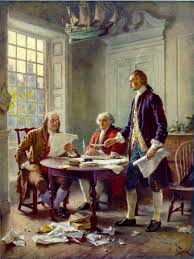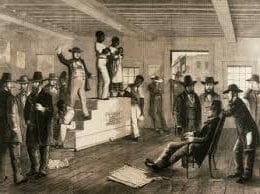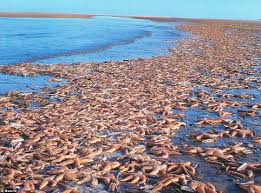I’m still musing over our Declaration of Independence.
 In my last blog, I mentioned that the signers of the Declaration of Independence reached an impasse in the wording of the document, particularly over the issue of slavery. I can imagine the opponents to slavery could have easily said something like, “How can we be so hypocritical in insisting on freedom from the British when we ourselves hold men in bondage?” How, indeed? In fact, many over the centuries have criticized our Founding Fathers for not taking a stronger stance on slavery. What an opportunity they had to set the record straight on their philosophy about the freedom of all men!
In my last blog, I mentioned that the signers of the Declaration of Independence reached an impasse in the wording of the document, particularly over the issue of slavery. I can imagine the opponents to slavery could have easily said something like, “How can we be so hypocritical in insisting on freedom from the British when we ourselves hold men in bondage?” How, indeed? In fact, many over the centuries have criticized our Founding Fathers for not taking a stronger stance on slavery. What an opportunity they had to set the record straight on their philosophy about the freedom of all men!
Slavery, however, was not their primary focus.
In that day, slavery was a huge, complicated problem, one that could not be solved in any short period of time. As history shows, it took almost another century and much embittered conflict to finally validate that all men were created equal. The Founding Fathers wisely discerned that British tyranny was the problem of the day. Dealing with the problem of Great Britain’s tyranny, not slavery or anything else, was their purpose for meeting together and the reason for the document that lay before them. If they had digressed into solving the problem of slavery, the entire process of becoming an independent nation would have floundered and American history could have turned out quite differently.
 The men who met in Philadelphia Hall chose their battle. They needed to guarantee the principle of liberty for all men first. They would deal with separation from Britain, and then the slavery issue later. While the decision came with risks and perhaps they did not make the slavery issue as high a priority as they should have once they established the young nation, tabling the slavery issue was the right decision at that moment.
The men who met in Philadelphia Hall chose their battle. They needed to guarantee the principle of liberty for all men first. They would deal with separation from Britain, and then the slavery issue later. While the decision came with risks and perhaps they did not make the slavery issue as high a priority as they should have once they established the young nation, tabling the slavery issue was the right decision at that moment.
Many groups, governing bodies, and relationships today face the temptation of focusing on the wrong problem. I see that in our federal government, local school boards, churches, and even in my own marriage. It’s human nature to get side-tracked, bring in other issues, or ask why the opposing side isn’t dealing with other problems. Those on the side-lines criticize the governing body for not doing more about the problem near and dear to their hearts. Never let a good crisis go to waste! Grab the moment to set the record straight about this bigger issue.
No, it’s not the right time. Sometimes, groups and governing authorities must make the hard decision to focus on the issue they can solve rather than attempting to solve the bigger issues and feeling guilty because the problems don’t solve easily.
Early church leaders had to do that. Acts 6 accounts how widowed foreigners complained to the top leadership that they were being mistreated in the daily distribution of food. The apostles revisited their marching orders. Their task, given by God was to preach The Word and spend time in prayer. They quickly turned the job of food distribution over to a team of competent men and went back to the work only they could do.
What am I called to do? Should I become involved in pro-life marches, raids on prostitution houses, volunteer hours at food pantries, and the political bandwagon to bring down irreparable candidates? Like the early Apostles and the Founding Fathers, I need to focus on what I can solve in the moment and on the task God has personally given me to do.
I cannot solve the larger social injustices. But I can make an impact.
The story is told of a young man who saw thousands of starfish washed ashore on a beach. An older man was throwing the starfish back into the ocean one by one. When asked why, the old man explained that the tide was going out and the sun will kill the starfish. But there are hundreds of miles of beach and thousands of starfish, the young man protested. “Your efforts won’t make any difference at all.”
The old man bent, picked up yet another starfish and threw it into the ocean. “It made a difference to that one.”
I can’t solve the race issues that stem from slavery 150 years ago and the civil rights injustices and riots of subsequent decades. I can befriend an African American and treat them as my equal.
I can’t solve the atrocities done to the American Indian. I can slip a twenty dollar bill in my church fundraiser to send our youth group on a short term mission trip to an Indian reservation so they can be ambassadors of God’s grace.
I can’t stop a war or even disarm a terrorist. I can supply a Bible to one of our military and pray like crazy that God’s Word, according to Isaiah 55:10,11, will accomplish what it was sent forth to do.
I can’t solve the problem of what seems like two totally incompetent Presidential candidates. I can select the best candidates for my local government and my school board. For that matter, I could run for a local office or do good in my community by belonging to a local civic group.
I can’t solve the problem of poor parenting in my community. I can work for an hour in my church nursery, teaching the children songs about Jesus, and hugging a child who hasn’t received a hug from Mom in a week.
Like the Founding Fathers who didn’t solve the problem of slavery by signing the Declaration of Independence, my efforts won’t solve the bigger problems of the past or present. My actions will matter in the moment and they will impact the person standing next to me. They may not be enough to bring about far reaching societal change, but they will have more impact than no action at all.

Leave a Reply